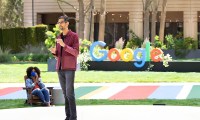
For some people, the reason for choosing one hair salon over another is based solely on its ability to book an appointment online. At the Google I/O developer conference, CEO Sundar Pichai explained how its Google Duplex technology can help the phone-shy avoid having to actually speak to someone to make an appointment.
Around 60 percent of U.S. businesses don’t have online booking systems, according to Google. It’s been working on a way for users to give a time and date to Google Assistant, which can then make the call and set up an appointment. “It brings together all our investments over the years in natural language understanding, deep learning, text to speech,” said Pichai.
It can be an incredibly complex interaction. Using an actual call between Google Assistant and a hair salon, Pichai showed how it would work. The user asked the Assistant to make an appointment on Tuesday morning “anytime between 10 and 12.” During the call,
“A long-standing goal of human-computer interaction has been to enable people to have a natural conversation with computers, as they would with each other,” wrote Google Principal Engineer Yaniv Leviathan and Vice President of Engineering Yossi Matias, in a blog post announcing the technology.
Google appears to be succeeding.
For the next call, Google Assistant had to overcome a bit of a language barrier. The restaurant employee thought it was calling to make a reservation for seven people, not for the seventh. When she informed the A.I. caller that the restaurant didn’t reserve tables for parties of fewer than seven, the A.I. asked how long the wait time would be. When the employee assured the Assistant it wouldn’t be a long wait on a Wednesday, it replied, “Oh, I gotcha, thanks.”
This technology isn’t quite ready at the moment, but Google is rolling out what Pichai called an “experiment.” During holidays, restaurants and businesses often have different hours. Google plans to use its Assistant to make one phone call to a bunch of businesses, then update their holiday hours for web searches. That way, restaurants can avoid getting dozens of calls about whether or not they’re open on Memorial Day, for example. Pichai said this experiment would start in a few weeks, so if it’s not working for that holiday, check again on the Fourth of July.
As exciting as it may be to have a remarkably human-sounding bot doing all your chores on your behalf, the Duplex announcement catalyzed quite a bit of controversy around how it would identify itself on the phone. After all, wouldn’t you want to know if you were speaking to a bot rather than a live being? Now, Google has weighed in, noting that it will include disclosures in the feature.
“We understand and value the discussion around Google Duplex — as we’ve said from the beginning, transparency in the technology is important,” a Google spokeswoman said in a statement. “We are designing this feature with disclosure built-in, and we’ll make sure the system is appropriately identified. What we showed at I/O was an early technology demo, and we look forward to incorporating feedback as we develop this into a product.”
Google further clarified that Duplex will “identify itself as the Google assistant” when making phone calls on behalf of its human users. As Bloomberg reports, the tech giant informed its employees at a weekly staff meeting that the AI bot would “inform people on the phone that the line is being recorded in certain jurisdictions.” It’s not entirely clear what those jurisdictions are, and Google has not commented further on the matter.
It’s still unclear as to whether or not the businesses used in Google’s demos were alerted to the fact that they were speaking to a bot, or that they were being recorded. And in certain states, recording conversations without both speaking parties’ consent and knowledge is against the law.
Updated on May 20: Google says Duplex will alert people when their conversations are being recorded, and that they’re speaking to a bot.
Editors' Recommendations
- The new Google Home app officially launches on May 11
- Finally, you can use a Google Nest smart speaker or display to find an iPhone
- Google I/O 2020 dates now set in stone, and that means Android 11 is coming
- JBL’s Google Assistant-powered Link Bar now available for purchase
- Google Duplex sounds a lot like a human — and sometimes it is one


